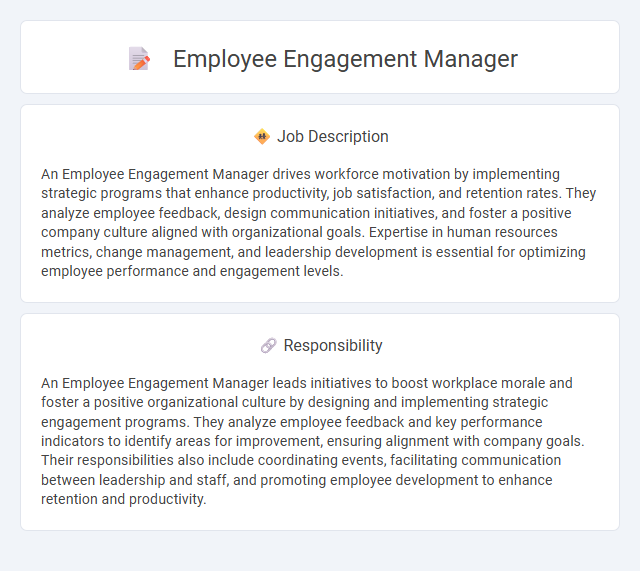
An Employee Engagement Manager drives workforce motivation by implementing strategic programs that enhance productivity, job satisfaction, and retention rates. They analyze employee feedback, design communication initiatives, and foster a positive company culture aligned with organizational goals. Expertise in human resources metrics, change management, and leadership development is essential for optimizing employee performance and engagement levels.
Individuals with strong interpersonal skills and a genuine interest in fostering positive workplace culture are likely to excel as Employee Engagement Managers. Those who are empathetic, proactive, and capable of handling diverse team dynamics probably find this role suitable, as it requires understanding employee needs and driving motivation. Candidates who struggle with communication or lack patience might not be ideal for this position.
Qualification
An Employee Engagement Manager must have a bachelor's degree in human resources, business administration, or a related field, with many employers preferring a master's degree or HR certification such as SHRM-CP or PHR. Proven experience in employee relations, organizational development, and communication strategies is essential to design and implement effective engagement programs. Strong skills in data analysis, conflict resolution, and project management are critical to measure engagement metrics and drive continuous improvement.
Responsibility
An Employee Engagement Manager leads initiatives to boost workplace morale and foster a positive organizational culture by designing and implementing strategic engagement programs. They analyze employee feedback and key performance indicators to identify areas for improvement, ensuring alignment with company goals. Their responsibilities also include coordinating events, facilitating communication between leadership and staff, and promoting employee development to enhance retention and productivity.
Benefit
An Employee Engagement Manager likely enhances workforce motivation and productivity by developing initiatives that promote a positive workplace culture. They probably facilitate improved communication and collaboration, which can reduce turnover rates and increase job satisfaction. Their role may also contribute to aligning employee goals with organizational objectives, boosting overall company performance.
Challenge
The role of an Employee Engagement Manager likely involves addressing complex challenges related to maintaining workforce motivation and satisfaction amidst changing organizational dynamics. Probable difficulties include effectively measuring engagement levels, designing impactful initiatives, and overcoming resistance to cultural change. Success may depend on strategic communication skills and the ability to foster a trusting, inclusive work environment.
Career Advancement
An Employee Engagement Manager drives workplace motivation by developing strategies that boost employee satisfaction and retention, directly influencing organizational productivity. Mastery in data analysis and communication fosters career advancement, positioning professionals for leadership roles in HR and corporate management. Proficiency in project management and change management further enhances opportunities for promotion within dynamic business environments.
 kuljobs.com
kuljobs.com